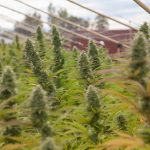Attorney General Jeff Sessions’ recent attempt to slow legal progress in the cannabis industry will have no effect on industrial hemp, which has support in Washington, according to industrial hemp industry leaders.
Legislators moved to support industrial hemp as recently as December, when the Industrial Hemp Banking Act (H.R. 4711), was introduced in the United States House of Representatives by Rep. Andy Barr of Kentucky and co-sponsored by Rep. James Himes of Connecticut and Rep. Jared Polis of Colorado. The bill seeks to ease strict requirements for banks serving the industrial hemp industry, and bar action by federal regulators.
“I’m co-sponsoring the bill because hemp’s potential is boundless, and I want to ensure companies can reap the benefits it has to offer and access customer and financial services like loans, credit card processors and banks,” Rep. Polis told HEMP.
In August, Rep. James Comer of Kentucky introduced the Industrial Hemp Farming Act of 2017, which would declassify hemp as a Schedule I narcotic under U.S. Drug Enforcement Agency policy.
“It’s a huge step forward,” Comer said in a release. “It reclassifies hemp to an agricultural crop like corn or soybeans where it belongs.”
Comer is planning to seek support for his bill in the Energy and Commerce Committee, as well as the House Judiciary Committee, but he said it is possible the bill might be included in the upcoming farm bill, according to DTN/The Progressive Farmer. While he supports hemp, Comer has said he does not support legalization of cannabis and is looking to “differentiate between marijuana and hemp.”
Hemp, Inc. CEO Bruce Perlowin said the ‘Session obsession’ with cannabis really has nothing to do with hemp at all. “The first two days of January, everyone went crazy. Sessions talks about his marijuana obsession, and all the pot stocks drop.
“We put out a press release saying – We’re industrial hemp. No matter what the federal government does, it won’t affect us,” Perlowin said.
North Carolina-based Hemp, Inc. (OTC PINK: HEMP) is a global leader in the industrial hemp industry, with the largest multi-purpose industrial hemp processing facility in the western hemisphere.
Perlowin said Washington’s recent support comes from years of educating politicians on hemp, especially emphasizing that hemp is not psychoactive, with a legal limit of under 0.3 percent THC. “For a long time, everyone thought hemp was marijuana. The politicians have been educated,” Perolwin said. “It’s much more accountable when you can’t get high – from hemp we can make rope, clothes, circulation material. Hearst paper mills and DuPont plastic aren’t around – there’s no real pushback to hemp anymore. The public-at-large doesn’t know as much about hemp as the politicians do. We have massive bipartisan support.”
Industrial hemp has state-side support as well. Washington removed hemp plants from the state’s controlled substance list in 2017 and launched an industrial hemp research pilot in 2014, but the program has been inactive due to lack of funding.
In 2017, Arkansas, North Carolina, Pennsylvania and Hawaii launched state-wide industrial hemp pilot programs. Wisconsin passed a law allowing farmers to grow industrial hemp. In New York, universities such as Ithaca and Cornell are running hemp research programs.
Perlowin said Sessions’ move to let the Cole memo expire this month – which removed the cannabis industry’s protections from federal prosecution – has only made political supporters more vocal about cannabis legalization.
“Why did the whole sector [stocks] go up after Session’s obsession came out? The pushback. The governor of Colorado called him a liar. He got pushback from California, and more governors, senators, congressmen. It united everyone in the industry. It has united the movement,” he said.
(826)





Leave A Reply